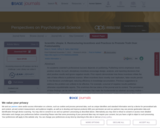
An academic scientist’s professional success depends on publishing. Publishing norms emphasize novel, positive results. As such, disciplinary incentives encourage design, analysis, and reporting decisions that elicit positive results and ignore negative results. Prior reports demonstrate how these incentives inflate the rate of false effects in published science. When incentives favor novelty over replication, false results persist in the literature unchallenged, reducing efficiency in knowledge accumulation. Previous suggestions to address this problem are unlikely to be effective. For example, a journal of negative results publishes otherwise unpublishable reports. This enshrines the low status of the journal and its content. The persistence of false findings can be meliorated with strategies that make the fundamental but abstract accuracy motive—getting it right—competitive with the more tangible and concrete incentive—getting it published. This article develops strategies for improving scientific practices and knowledge accumulation that account for ordinary human motivations and biases.
- Subject:
- Psychology
- Social Science
- Material Type:
- Reading
- Provider:
- Perspectives on Psychological Science
- Author:
- Brian A. Nosek
- Jeffrey R. Spies
- Matt Motyl
- Date Added:
- 08/07/2020